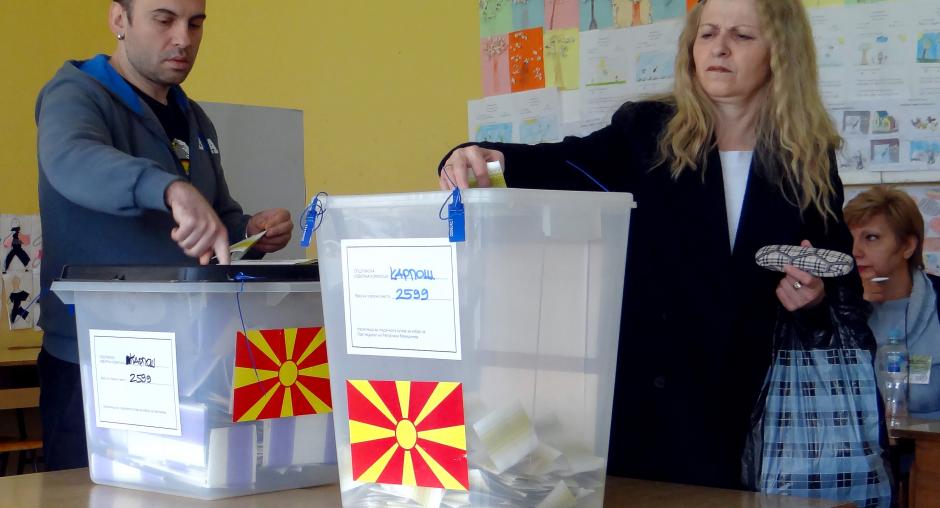Shortcomings during campaign overshadow generally well-run election day, international observers say in Skopje

SKOPJE, 28 April 2014 – Fundamental freedoms were respected and candidates were able to campaign without obstruction in the 27 April elections in the former Yugoslav Republic of Macedonia, but shortcomings identified in the first round of the presidential election two weeks earlier, including the blurring of state and party activities and biased and unbalanced media coverage in favour of the ruling party, either persisted or were more pronounced, international observers said in a statement issued today.
“Yesterday’s elections were effectively administered and election day went smoothly, but there were real problems before and, unfortunately, after the vote,” said Christine Muttonen, the Special Co-ordinator who led the short-term OSCE observer mission. “The governing party did not adequately separate its party and state activities while, regrettably, the major opposition party announced it would not recognize the election results. I strongly encourage all political actors to work together to create a positive post-election environment.”
The observers noted that there continued to be credible allegations of voter intimidation, including pressure by one party on ethnic Albanian voters to boycott the presidential ballot.
“This election process did not contribute to reducing the tensions that exist between and within ethnic communities,” said Stefan Schennach, Head of the delegation from the Parliamentary Assembly of the Council of Europe (PACE). “The election was a missed opportunity for political stakeholders to demonstrate a genuine commitment to integrating all ethnic communities and minorities. PACE, with the support of the Venice Commission, remains ready to provide support for electoral improvements and further democratic consolidation in the country.”
Media monitoring during the campaign period identified a bias in favour of the ruling party and its presidential candidate in the majority of monitored media, accompanied by negative reporting on the main opposition party and its presidential candidate. The lack of analysis and independent reporting identified in the first round of the presidential election continued during the second round and the parliamentary election, the statement said.
“The media monitored were largely biased in favour of the ruling party and the incumbent presidential candidate, while reporting negatively on the campaign of the main opposition party,” said Isabel Santos, Head of the OSCE PA delegation. “All stakeholders should take a serious look at these findings, and then work together to create the conditions for a freer and impartial media environment.”
Both the parliamentary and second round presidential campaigns were active, and all parties engaged in a vigorous schedule of rallies, the statement said. A significant advantage in resources and predominance in political advertising meant, however, that the ruling party and its presidential candidate dominated the campaign environment. The clear support they received from the government during the campaign did not respect the separation of party and the state. As in the first round of the presidential election, there was a steady stream of accusations of corruption within the ethnic blocs.
The State Electoral Commission (SEC) met most of its legal deadlines and held regular sessions, most of which were open to observers and the media, but continued to be divided along party lines on all contentious issues. As in the first round, the SEC did not communicate effectively with the Municipal Election Commissions (MECs), causing some confusion regarding procedures. The MECs did carry out their duties in a professional manner, the observers said.
A number of Electoral Code provisions regulating the parliamentary elections were amended in January 2014, addressing some prior OSCE/ODIHR recommendations. Inconsistencies and ambiguities remained, however, including in the legal definition of campaigning and the length of the campaign, as well as provisions on the use of public resources during the campaign.
“To characterize the elections in a nutshell, the run-up failed to meet important OSCE commitments, including on the separation of state and party, on ensuring a level playing field, on the neutrality of the media, on the accuracy of the voters list and on the possibility of gaining redress through an effective complaints procedure,” said Ambassador Geert-Hinrich Ahrens, Head of the election observation mission from the OSCE Office for Democratic Institutions and Human Rights (OSCE/ODIHR). “All of this, unfortunately, overshadowed an election day that did meet commitments and was orderly and peaceful.”
The electoral dispute-resolution mechanism remained ineffective. There is a lack of deadlines for courts to resolve several types of election-related cases and the right of voters to legal redress is limited in all stages of the electoral process, the statement said.
Election day was conducted in a smooth and professional manner, although some technical irregularities were noted. The overall assessment of polling station openings, voting, and the counting and tabulation of votes was positive.
For further information contact:
Roberto Montella, OSCE PA, +389 (0)77 594 872 or +43 699 104 286 81, [email protected]
Thomas Rymer, OSCE/ODIHR, +389 (0)77 594 451 or +48 609 522 266, [email protected]
PACE Communication Division, +33 388 413 193
